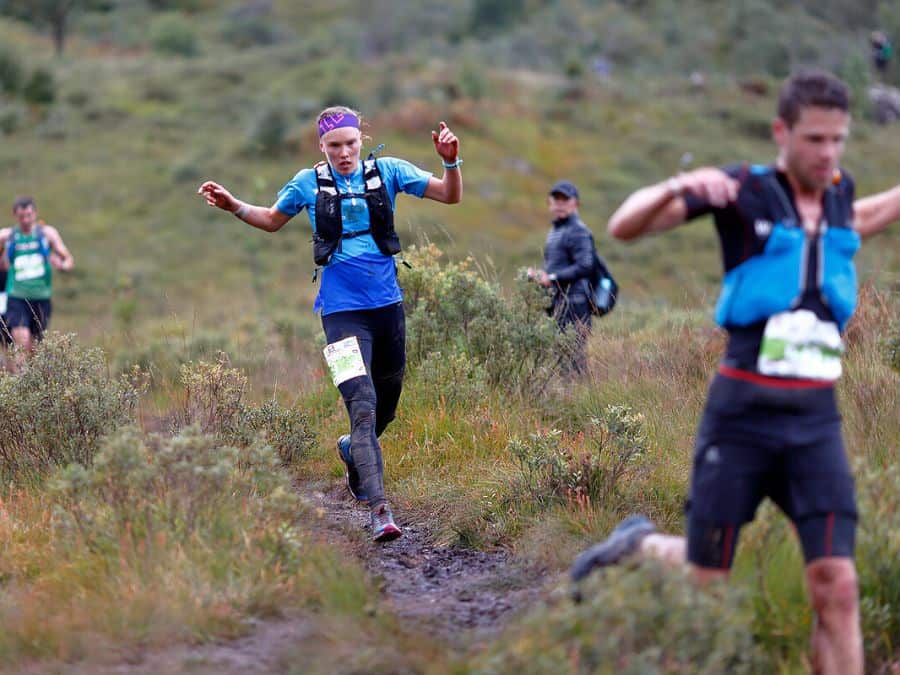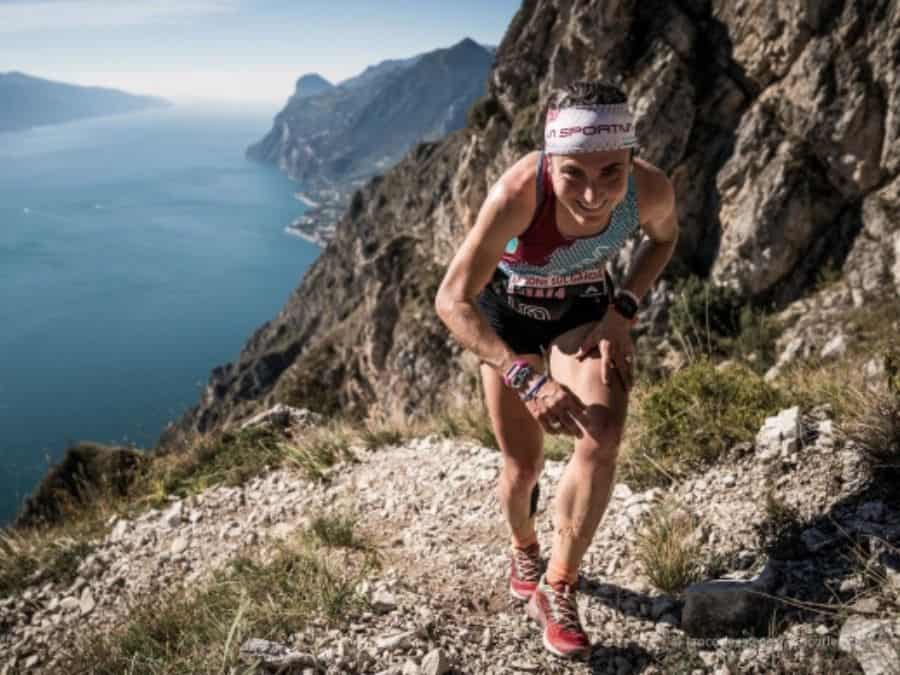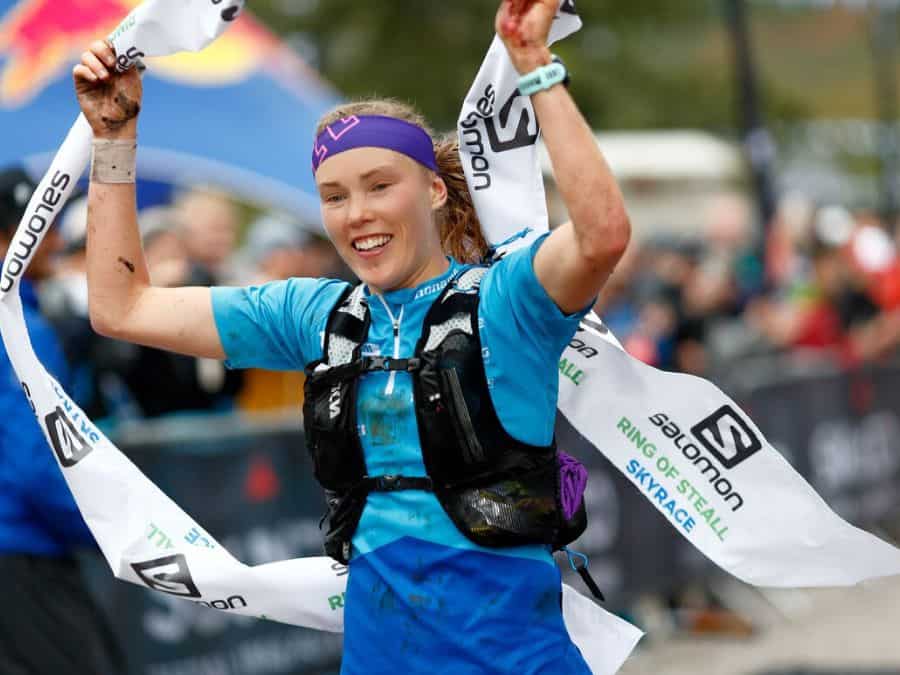In our RT Snap Q&A series, we’ve had the privilege of interviewing some of the world’s best runners, delving into their extraordinary journeys, celebrating their achievements, and exploring the unwavering dedication that defines their careers.
Tove Alexandersson
- Born: April 14, 1993
- Nationality: Sweden
- FootO, SkiO and Trail Running
Tove Alexandersson is a legendary figure in the world of endurance sports, with a career that spans orienteering, ski-orienteering, skyrunning, and skimo. She has been crowned World Champion in multiple disciplines, a testament to her extraordinary versatility and dominance in endurance events.
Tove’s journey began at a young age with orienteering, where she competed in her first race when she was just 1 year old. This early exposure to varied terrains laid the foundation for her ability to excel in a wide range of challenging environments, from dense forests to rugged mountain trails.
Her transition to trail and mountain running was both unexpected and spectacular. In 2017, after a successful orienteering season, she entered the Skyrunning World Series final on a whim, and not only participated but won the race.
This victory led her to pursue the World Championship the following year, which she also claimed, solidifying her status as one of the most accomplished endurance athletes. Tove’s ability to combine tactical thinking with physical endurance, honed in orienteering, translated seamlessly into skyrunning, where navigating difficult terrains is a key element.
Tove continues to dominate in her field, with an impressive array of World Championship titles under her belt. Her training focuses on a combination of mountain running, skiing, and orienteering, ensuring that her body is prepared for the variety of challenges that each event presents. Despite her success, she remains grounded, with a clear focus on improving her performance and staying adaptable to new challenges in her athletic journey.
View this post on Instagram
RT: Trail running demands endurance, speed, and adaptability to varying terrains. What inspired you to explore this discipline, and how did your background in orienteering influence your success in skyrunning and trail races?
Tove: I started with orienteering at a very young age. I did my first orienteering race when I was only 1 year old, so orienteering has always been a big part of my life. In orienteering, you need to be able to handle all kinds of running—everything from running up and down super steep slopes in the forest to fast running on a flat road. The terrain can be heavy with a lot of wet marshes or technical with a lot of stones, and everything in between. From a young age, I’ve learned to run in many different kinds of terrains.
View this post on Instagram
The first longer trail race I did was in 2017. It was the final in the Skyrunning World Series, and I went there together with some orienteering friends after the orienteering season. I hadn’t prepared specially for the race; it was more like a vacation and a way to try something new. But I won the race, and that was a cool experience. I decided to go for the World Championship the year after. I won that race as well, and I think these two races are the victories I value highest so far, mostly because they were a bit unexpected, and I also surprised myself.
RT: Your versatility in endurance sports is exceptional. Could you walk us through a typical training week focused on running, and how you balance intensity and recovery to prepare for trail and mountain competitions?
Tove: Actually, I don’t have so many training weeks focusing on mountain races, as orienteering is my main sport. But I really like to run long sessions in the mountains, and I also like to run hill intervals, so that’s good preparation for trail and mountain races as well.

My training weeks vary a lot, but here is a training week from the summer when I ran a trail race:
Monday:
- 40 min Hill intervals (2h in total)
- 2h Trail running
Tuesday:
- 3h 40 min Mountain running
- 45 min Rollerskiing
Wednesday:
- 55 min Orienteering intervals (2h in total)
- 1h 35 min Trail running
Thursday:
- 3h Mountain running
- 1h 15 min Uphill with poles
Friday:
- 40 min Orienteering intervals (1h 30 min in total)
- 50 min Rollerskiing
Saturday:
- Rest day
Sunday:
- Trail race: Fletta Trail (1h 38 min)
- 2h 15 min in total
- 40 min Run
RT: Running in extreme conditions and challenging terrains is part of your success. Can you share a particularly tough race or moment in your running career and how you overcame it?

Tove: The biggest challenges I have had during a race are when I have hit the wall because I haven’t had enough energy with me. The first longer race I did was almost 3.5 hours, but the only energy I had with me was two gels (and I didn’t eat anything at the stations). I thought that would be enough for 3.5 hours, but it definitely wasn’t. After that, I learned the importance of fueling properly during a race.
RT: You’ve excelled at the highest level in trail and mountain running. What are your next running-focused goals or challenges you’re aiming to conquer?
Tove: For the moment, I don’t have any big goals in trail running, but I’m planning to focus a bit more on trail running in a few years. However, next season, orienteering will still be my main focus.
View this post on Instagram
RT: Long-distance running, especially in demanding environments, requires both physical and mental resilience. How do you maintain focus and composure during critical moments in races?
Tove: To keep focus during a trail race is not a problem for me, as I’m used to orienteering races where you really need to be focused every second. So, for me, trail races can be a bit boring sometimes because I don’t need to keep the focus in the same way as during orienteering races. I’m always happy when the terrain is really technical so that I have something to focus on. Of course, the terrain can be really technical and challenging sometimes, but I really like that!
View this post on Instagram
RT: For aspiring runners looking to follow in your footsteps, what advice would you give about building a successful career in trail running, particularly in handling setbacks and staying motivated?
Tove: To have a successful career in trail running and stay motivated while handling setbacks, I think one important thing is to have another form of training that you enjoy, which is not running. Trail running is really hard on the body, and if you’re just running all the time, you will probably get some injuries. I also think it’s good for motivation to have some variation in the training. I like biking, and during winter, I do a lot of skiing.
